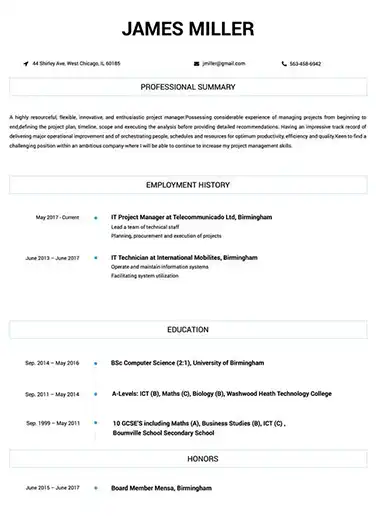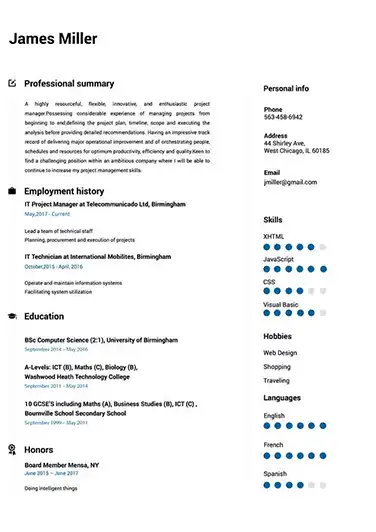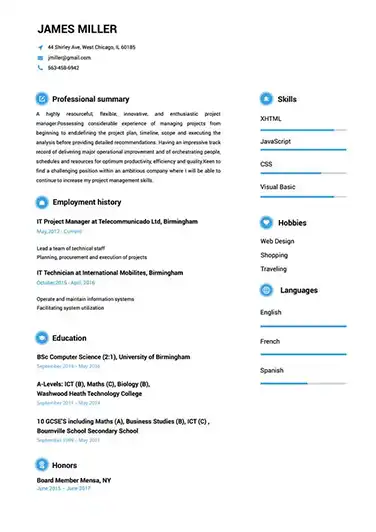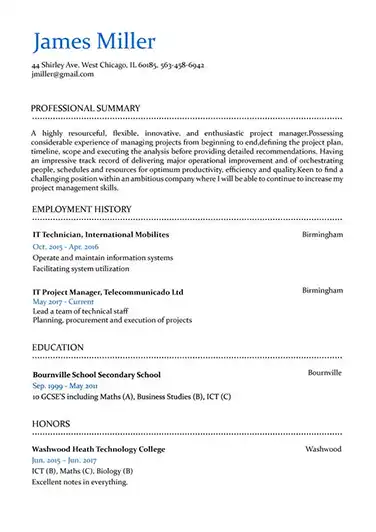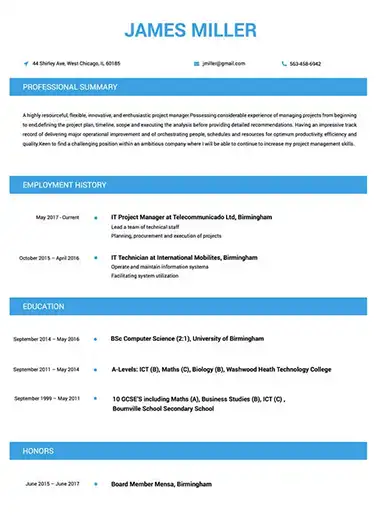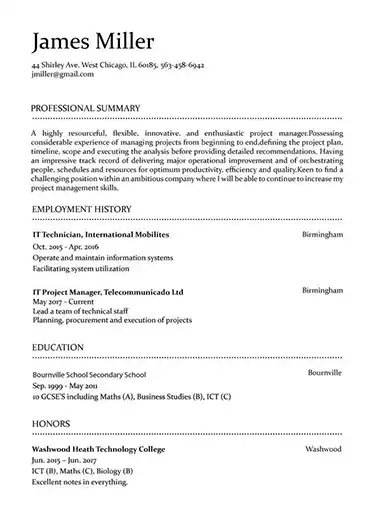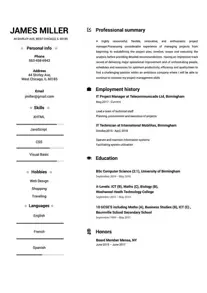 Use This Template
Use This Template
Build your resume in 15 minutes
Create an awesome resume that meets the expectations of potential employers with our selection of professional, field-tested resume templates.
actor: Resume Samples & Writing Guide
millerollie23@icloud.com
781-220-2167
Employment history
- Collaborating with other artists and designers to create visual designs
- Staying up-to-date on the latest trends in the art and design field
- Managing budgets and timelines for projects
- Researching and analyzing current trends in art and design
- Developing creative concepts and ideas for artistic projects
- Developing and implementing creative strategies for marketing and promotion
- Developing and implementing creative strategies for marketing and promotion
- Working with clients to understand their needs and develop effective solutions
- Ensuring adherence to industry standards and regulations
Education
Skills
Do you already have a resume? Use our PDF converter and edit your resume.
irving.derek@zoho.com
799-541-5092
Employment history
- Staying up-to-date on the latest trends in the art and design field
- Maintaining a portfolio of artistic and creative work
- Developing creative concepts and ideas for artistic projects
- Developing and implementing creative strategies for marketing and promotion
- Staying up-to-date on the latest trends in the art and design field
- Managing budgets and timelines for projects
- Researching and analyzing current trends in art and design
- Collaborating with other artists and designers to create visual designs
- Producing and managing artistic projects and events
Education
Skills
davis_vincent@mail.com
759-281-1431
Professional Summary
Employment history
- Developing and implementing creative strategies for marketing and promotion
- Researching and analyzing current trends in art and design
- Collaborating with other artists and designers to create visual designs
- Producing and managing artistic projects and events
- Ensuring adherence to industry standards and regulations
- Staying up-to-date on the latest trends in the art and design field
- Creating and executing innovative design solutions for art direction
- Utilizing various design software to create visuals
- Performing in artistic and creative roles in theatre, film, television, and other media
Education
Skills
francisedwards@outlook.com
902-514-8529
Professional Summary
Employment history
- Utilizing various design software to create visuals
- Staying up-to-date on the latest trends in the art and design field
- Collaborating with other artists and designers to create visual designs
- Creating and executing innovative design solutions for art direction
- Developing and implementing creative strategies for marketing and promotion
- Researching and analyzing current trends in art and design
- Developing and implementing creative strategies for marketing and promotion
- Utilizing various design software to create visuals
- Working with clients to understand their needs and develop effective solutions
Education
Skills
neilwhite55@hotmail.com
748-073-7609
Employment history
- Creating storyboards, sketches, and other visuals to illustrate concepts
- Creating and executing innovative design solutions for art direction
- Ensuring adherence to industry standards and regulations
- Staying up-to-date on the latest trends in the art and design field
- Developing and implementing creative strategies for marketing and promotion
- Researching and analyzing current trends in art and design
- Researching and analyzing current trends in art and design
- Managing budgets and timelines for projects
- Maintaining a portfolio of artistic and creative work
Education
Skills
Not in love with this template? Browse our full library of resume templates
Do you dream of being the next Helen Mirren or Jack Nicholson? Or perhaps you wish to emulate the success of Idina Menzel or Ben Platt?
Every actor or actress knows the feeling of wanting to be finally recognized for their talent. After all, you work tirelessly to refine your craft so that you can land a role in the next big TV show, film, or stage production. It is no doubt a gruelling process to try to crack into this highly-competitive industry. It’s especially hard to remain motivated when you know you’re ready for your time in the spotlight, but you keep receiving countless rejections.
So what if we told you that the reason why you’re not landing more roles isn’t necessarily because you’re not right for the part. It could be that your resume simply isn’t up to scratch. Yes, your resume could be costing you acting jobs.
The fact of the matter is that your resume will significantly increase or decrease your chances of getting called in for an audition. It may not seem exactly fair—but the reality is that a casting director will pass you over for another actor or actress if your resume fails to make a lasting impression.
That being said, you’ll be the one they start calling in if you take steps to improve your acting resume! So how can you make a resume that casting directors won’t be able to turn away from? We’ve put together the following comprehensive guide to creating the ultimate acting resume.
Our acting resume guide will cover a range of important topics including:
- How to professionally format your acting resume
- What casting directors are looking for
- Which skills to highlight
- Whether you really need a headshot
- How to make your resume stand out
1. Multiple Template Examples
2. How to Write a Perfect Acting Resume
How to format your acting resume
The key to making the perfect acting resume is to leave no doubt in the casting director’s mind why you’re the best actor or actress for the job. While it may come as a surprise to you, the format you choose for your resume can support you to achieve this.
To help you understand why, think about it in terms of acting. An audience will not be moved if your character has brilliant lines but your delivery is off. Likewise, a casting director will fail to be impressed if your resume is well-written but poorly formatted.
The best format for an acting resume is reverse-chronological format. Therefore, you should feature your most recent acting credit at the top of the “Acting Experience” section in your resume. The acting credit you completed immediately before that should appear next, and so forth.
You will also need to include an education section in your resume that includes details about your college education and/or training at an acting school. For expert pointers on how to create a masterful education section, refer to the section, “Make your education section shine” in our guide.
In terms of the layout of your acting resume, it is wise to stick to these recommendations:
- Number of Pages: 1 page maximum.
- Fonts to Use: Legible and clear fonts such as Tahoma or Garamond.
- Fonts to Avoid: “Playful” fonts such as Ultra and Lobster.
- Margins: 1 inch on all sides.
- Line Spacing: 1 or 1.15.
- Header size: 14-16 point size.
- Text size: 11-12 point size.
Pro tip: There are no exceptions to 1 page limit! If you are having trouble fitting everything in, consider culling some of the less relevant experiences or skills from your resume.
What recruiters will look for
In the world of acting, there’s one main type of “recruiter” you will need to impress with your resume: casting directors. Casting directors are in charge of selecting the very best talent for a given role. They do this by fielding hundreds to thousands of applications to find the most suitable person to bring a role to life.
As each acting role they need to fill is unique, the qualities a casting director will look for will change. That being said, casting directors are by and large looking for an actor or actress who possesses an enticing combination of the right acting experiences, skills, and education. Additionally, the actor or actress needs to look the part.
What they are looking for will depend on the type of production they are in charge of casting for. A casting director for an amateur production will be looking for a very different actor or actress than one for a multi-million dollar professional production.
So how exactly do they track down someone who has all of these qualities and more? By sorting through the acting resumes that have been submitted to them. That’s why it’s absolutely non-negotiable to create a resume that puts your very best qualities and achievements front and center.
What skills to mention and how to do it correctly
Your unique skill set as an actor or actress is what differentiates you from your competition. For this reason, it’s vital that in your resume you list your skills in a section called “Special Skills” or “Additional Skills”.
You will no doubt already have a variety of skills under your belt, but it’s crucial that you don’t just copy and paste the same skills on every application. Make sure to pick the most relevant ones to the job you are applying to - and your most outstanding ones at that.
For example, if you’re auditioning for a part in a movie set in Spain and you have an intermediate level of Spanish, list it. Likewise, if you’re auditioning for a part in a musical and you are a classically trained singer, note this down.
Be sure to specify your skill level and any other relevant details, as appropriate. For example, specify what type of dance you specialize in as well as your ability level.
Below are some of the most common types of skills to list in an acting resume:
- Dancing ability
- Singing ability
- Voice training
- Stunt training
- Music ability
- Accents
- Any foreign languages you speak
- Any acting methods you are trained in
- Sports you are skilled in
Pro tip: Don’t waste space listing skills that are irrelevant to the role you’re applying for. For example, you may have years of stunt experience, but if you’re auditioning for a period piece, leave it off your resume.
What achievements to mention and how to do it correctly
In most cases, your resume will be the first impression a casting director gets of you. You therefore need to carefully handpick which acting achievements you will feature.
If you have limited acting experience, consider including any college or acting school productions you acted in. Whereas, if you have extensive experience and are having trouble fitting it all on your resume, you will need to determine which of your acting credits are most relevant to the role at hand.
In order to present your achievements correctly, you need to format them in a logical and eye-catching manner.
We recommend dividing your achievements into 3 main sections with the following headings, as appropriate to your acting experience:
- Film
- Television
- Theatre
Each section should formatted into three columns, as follows:
Film
The name of the film | The type of role (Principal; Supporting; Lead) | The name of the production company and director (or the name of the school if it is a student production)
For example:
7 Days in Budapest | Principal | Claudia Anderson/ABC Studios
Glass Half Empty | Supporting | Jeffrey Klein/Hummingbird Film
Television
The name of the TV show | The type of role (Regular; Recurring; Series; Guest Star; Co-Star) | Network or production company
For example:
Enemies | Recurring | XY Productions
The Single Man | Regular | Channel 20
Theatre
The name of the theatre production | The role you played | The name of theatre and the location (the state) where the production took place
For example:
The Taming of the Shrew | Petruchio | Yellow Theatre, NY
Chicago | Roxie Hart | Memory Lane Theatre, LA
Pro tip: Order the 3 main sections so that your most impressive achievement is positioned first. For example, if your shining achievement is a TV role you starred in, position the television section first.
What to avoid mentioning
So far, we’ve focused on which essential pieces of information you need to include your resume. So is there anything you should avoid mentioning? Prevent any potential resume faux pas by steering clear of the following:
Non-Acting Work Experience
Your acting resume should exclusively focus your acting experiences. Any other non-acting work experience should be excluded. The simple reason is that your resume should act as a showcase of your acting skills and experiences, so including any irrelevant information will divert focus off of your acting talent.
Pro tip: Don’t let your non-acting experience go to waste! Simply create another resume that features these non-acting positions. You’ll be able to use this resume any time you apply for non-acting jobs.
Extra work
If non-acting work experience should be left off your resume, surely extra work is fine to include, right? It can be tempting to include any extra or background actor work in the experience section of your acting resume. However, including these experiences is also a big no-no when it comes to applying for acting roles.
While your extra work required you to use your acting skills, it simply doesn’t involve the same level of work as a regular acting role. Casting directors casting for an acting role only want to see relevant work experience on your resume, and unfortunately, extra roles do not count.
Pro tip: The “exclude any extra work” rule even still applies if you were an extra in a blockbuster movie or well-known stage production.
How to write a resume objective (with examples)
Are you wondering how you’re meant to catch your big break if you have minimal acting experience? Crafting a persuasive and passionate resume objective could be just the thing that convinces a casting director to give you a chance.
A resume objective provides a casting director with an insight into what your acting aspirations are as well as your passion for the craft. It should only be 2-4 sentences, so you will need to be concise. To really make your resume objective memorable, try to incorporate either a notable achievement you have to your name or something particularly eye-catching about your acting profile.
Here are a few resume objective examples to inspire you:
- Actor with two years of professional training at the American Musical and Dramatic Academy looking to play a supporting role in a major Hollywood production. Has undertaken 5 years of private stunt and voice training.
- Theatrically trained actress seeking a breakthrough role in a local theatre show. Winner of The New York Film Academy’s Merit Based Tuition Award. Aspires to one day be cast as the lead in a Broadway production.
How to write a resume summary (with examples)
Unlike a resume objective, a resume summary is appropriate for experienced actors and actresses. You can think of a resume summary as your elevator pitch. It should emphasize your most attractive qualities and experiences related to acting that would bowl over even the most hardened casting director.
In 2-4 sentences, focus on communicating your attributes as an actor or actress. The goal should be to convince the hiring director that your resume is worth taking a closer look at - or even to contact you on the spot! You can also briefly mention your acting goals if you wish.
Here are a few resume summary examples to inspire you:
- Actress with over 10 movie credits to her name, including a supporting role in a movie that grossed over $12 million in the box office. Saturn Award winner for Best Supporting Actress and two-time Independent Spirits Award winner for Best Female Lead. Seeking a lead role in a feature horror film.
- Dedicated method actor with 14 years of experience in local and national theatre productions. A Juilliard alumni who has played Hamlet for 5 seasons at the renowned Three Ships Theatre in North Carolina. Looking to land a major role in a national musical theatre production touring the country.
Pro tip: Remember to tweak your resume summary with each application so it is customized to the role at hand!
Why a headshot is important for an acting resume
An acting resume is only one of a handful of resumes where a headshot is absolutely essential. If you thought a headshot was just a “nice to have,” keep in mind that most casting directors won’t give the time of day to a resume without one.
The reason why a headshot is so important for an acting resume is because casting directors usually have a particular “look” in mind for each role. They want to be able to immediately gauge whether you may be a good physical fit for a role, and they do this by looking at your headshot.
That’s not to say you don’t have a chance if your look is different to what they had in mind. In fact, a casting director may not know what they’re looking for until they see your headshot!
To ensure your headshot ticks all the right boxes, you’ll have to get it professionally taken. Don’t be tempted to take a DIY headshot - it will show. You want to look like a consummate professional, not an amateur, so you need a headshot to match.
Pro tip: Your headshot should be 8 x 10 in size. Make sure to position it in the top right- or left-hand corner of your resume.
What additional information is necessary and how it can help you land more jobs
Physical attributes
A casting director will likely spend only a few moments checking over each resume. One thing they will definitely look for are your personal stats. Your resume must clearly note down your physical attributes including your:
- Height
- Hair color
- Eye color
- Weight
Contact information and online acting profile
If a casting director believes you could be a good fit for a role, they will want to reach out to you to discuss any further details or invite you in for an audition. Your contact details therefore need to be clearly identifiable on your acting resume.
The casting director may also want to delve deeper into your acting history or see if you have an online presence as an actor or actress. That’s why you should also make sure to include details about your online acting profile, whether it’s a website about your acting work or your IMDB profile.
At the top of your resume, make sure to provide the following information:
- Full name
- Address
- Telephone number
- Email address
- Website and/or IMDB profile
Pro tip: If you have an agent, you should additionally include their name and agency, and ensure you provide their phone number instead of your own.
Union Membership
If you are part of an acting union, it is critical to make note of this on your resume. Union membership shows a casting director your commitment to acting and enhances your credibility within the industry. These are two attributes they are known to look favorably on and are helpful in setting you apart from other actors and actresses without union membership.
Pro tip: Rather than write out a union’s name in full, use their initials e.g. AEA (Actors’ Equity Association) and SAG (Screen Actors Guild).
How to list your acting experience and awards
If you have won any acting awards from within the industry, congratulations! You should use this recognition of your acting abilities to your advantage on your resume.
There are two main ways to emphasize your award/s in your acting resume:
- Include an “Awards” section on your resume and list it there.
- Add it in italics underneath the relevant role within the job description section of your resume
Whichever you choose, make sure that you include the following information:
- The organization you received the award from
- The name of the award / the award category
- The role you received the award for
- The year you received the award
Pro tip: Only include industry-recognized awards you have received. Unofficial awards, such as a competition run on Facebook, should be left off.
3. Differences Between Theatre Actor Resumes and Film/TV Resumes
There are a handful of notable differences between theatre actor resumes and film/TV resumes. These can be clearly seen in the section above, “What achievements to mention and how to do it correctly.”
As you may have noticed, the way you should write out your theatre acting credits is not the same as your film and TV credits. The primary difference is that for a theatre acting credit, you should state what role (i.e. which character) you played.
However, you should not do this for your TV or film acting credits. Instead, you should state the type of role you played (e.g. Principal, Supporting, Lead, etc).
There are a few other differences, too. For theatre credits, you will also need to include the name of the theatre production, the theatre company’s name, as well as the location where the production took place.
In contrast, for both film and TV credits, you will need to include the name of the film/TV show and the name of the production company/network. For film credits, you will also need to include the name of the director.
4. How to Make Your Resume Stand Out
You won’t need a reminder of just how competitive it is to score a role, whether it’s big or small. To give yourself the absolute best shot of wowing a casting director, you’ll have to go above and beyond to impress them. Here are a few things you can do to make your resume stand out:
Make your education section shine
Your education section may seem like the most dull part of your resume, but this couldn’t be further from the truth. Your education section should shine just as much as the rest of your resume. After all, being a well-trained actor or actress shows discipline, determination, and passion. It also reiterates that you are skilled and have taken the steps to transform from an amateur into a professional.
A straightforward way to make your education more eye-catching is to include any seminars, acting workshops, masterclasses, or private acting classes you have undertaken. If you trained under a notable teacher, don’t be shy to note this down as well.
Be completely truthful
Casting directors are highly-experienced professionals who have turned the process of finding the next big thing into an art form. Part of their success comes from knowing precisely what to look for in a resume...including any red flags.
That’s why it is pivotal to be completely truthful on your resume. You may think a few white lies here and there won’t cause any harm, but if you get caught telling them you could ruin your reputation before you even get your big break!
Remember, integrity is everything as an actor, and it is difficult to gain back after it’s been lost. Just take it from Mike Fenton, a well-known casting director and co-founder of the Casting Society of America, who has been quoted as saying, “A reasonable resume is one that doesn't have too many little white lies on it.”
Don’t forget to include your age range
With so many components to remember to include in your resume, it is a common mistake to think that it’s necessary to include the age range you can play. However, it is crucial to include an age range as what you put will play a big part in whether or not you score a given role.
In order to provide an accurate range, it’s a good idea to ask a few of your professional contacts for their opinion. Don’t leave it to your own guess work!
As we stressed above, it is vital that you are completely truthful. Casting agents will sense something is up if you write that you can pull off playing a 25 to 35 year old when your headshot clearly shows you are more suited to playing a 40 to 50 year old. Be realistic, and you’ll soon start landing the right roles.
5. How to Use a ResumeBuild Template to Make an Acting Resume
Just like working on your craft, putting together a strong acting resume takes time, expertise, and effort. If you have all of these and would like to try putting together a DIY resume, you can just follow our guide above. But if you’d rather channel that time and energy into auditioning and practicing lines, why not use a resume builder instead?
Our easy-to-use resume builder is designed to help professionals like yourself make resumes that land high-quality acting jobs. When you use our resume builder, you’ll be able to choose from one of the many HR-approved resume templates we have created.
What makes our resume builder particularly useful for busy actors and actresses is that we give you all the tools you need to create a custom resume quickly and conveniently. For example, we offer acting professionals a range of pre-written examples of acting achievements that you’re welcome to add to your resume. You can access them in a couple of easy steps:
- In the “Experience” section of our resume builder, scroll down until you see the “Job description” box.
- On the right-hand side, find the subheading, “Career Field”. Use the drop down menu underneath to find and select “Performing Arts”.
- In the “Career Subfield” drop down menu next to it, select “Actors”.
- You will be presented with a range of job descriptions suitable for actors. Select the ones you want to use.
- After you have added your chosen job descriptions, you can edit them to make them more appropriate to your unique acting experiences.
Remember, if you’re done wasting time trying to figure out all the ins and outs of making the perfect acting resume, there is another way. Our resume builder will ensure your name is up in the lights in no time.
actor Job Descriptions; Explained
If you're applying for an actor position, it's important to tailor your resume to the specific job requirements in order to differentiate yourself from other candidates. Including accurate and relevant information that directly aligns with the job description can greatly increase your chances of securing an interview with potential employers.
When crafting your resume, be sure to use action verbs and a clear, concise format to highlight your relevant skills and experience. Remember, the job description is your first opportunity to make an impression on recruiters, so pay close attention to the details and make sure you're presenting yourself in the best possible light.
actor
- Sing and/or dance during dramatic or comedic performances.
- Read from scripts or books to narrate action or to inform or entertain audiences, utilizing few or no stage props.
- Tell jokes, perform comic dances, songs and skits, impersonate mannerisms and voices of others, contort face, and use other devices to amuse audiences.
- I work at All Saint Lunatic Asylum, Midnight Dreary Production Studio, LLC. I entertain our line before they enter our haunt. I have also helped build sets and organize and reset sets for the haunt and our escape room.
actor
- after acting classes i would Study and rehearse roles from scripts in order to interpret, learn and memorize lines, stunts, and cues as directed.
- Before the first run through of the show i would Learn about characters in scripts and their relationships to each other in order to develop role interpretations.
- sometimes it can be hard for me to Perform humorous and serious interpretations of emotions, actions, and situations, using body movements, facial expressions, and gestures.
- I always try to Portray and interpret roles, using speech, gestures, and body movements in order to entertain, inform, or instruct radio, film, television, or live audiences.
- I always have to remember that if I did get a role every roll makes the show great and every roll matters even if they do not speak.
- i always
- Harmonize body movements to rhythm of musical accompaniment.Attend or view productions in order to maintain knowledge of available actors.
actor
- Studied and rehearsed for the role of Johnny in “Johnny Gets Hit by a Bus” in order to interpret, learn and memorize lines, stunts, and cues as directed.
- Worked closely with teachers and other actors to find the interpretation most suited to the role.
- Collaborated with other actors, stagehands, lighting department, and sound as part of an ensemble.
- i try to Study and practice dance moves required in roles.
actor/dancer
- Harmonize body movements to rhythm of musical accompaniment.
- Perform classical, modern, or acrobatic dances in productions, expressing stories, rhythm, and sound with their bodies.
- Collaborate with choreographers in order to refine or modify dance steps.
- Perform in productions, singing or acting in addition to dancing, if required.
- Read and study story lines and musical scores to determine how to translate ideas and moods into dance movements.
- Coordinate production music with music directors.
actor
- Acted in an escape room.
- Monitored costumers.
- Aided in checking and accepting tickets.
- Portray and interpret roles, using speech, gestures, and body movements in order to entertain for live audiences.
actor Job Skills
For an actor position, your job skills are a key factor in demonstrating your value to the company and showing recruiters that you're the ight fit for the role. It's important to be specific when highlighting your skills and ensure that they are directly aligned with the job requirements, as this can greatly improve your chances of being hired. By showcasing your relevant skills and experience, you can make a compelling case for why you're the best candidate for the job.
How to include technical skills in your resume:
Technical skills are a set of specialized abilities and knowledge required to perform a particular job
effectively. Some examples of technical skills are data analysis, project management, software proficiency,
and programming languages, to name a few.
Add the technical skills that will get hired in your career
field with our simple-to-use resume builder. Select your desired resume template, once you reach the skills
section of the builder, manually write in the skill or simply click on "Add more skills". This will
automatically generate the best skills for your career field, choose your skill level, and hit "Save &
Next."
- Graphic Design
- Illustration
- Photography
- Video Editing
- Animation
- 3D Modeling
- Motion Graphics
- Audio Editing
- Visual Effects
- Lighting Design
- Sculpting
- Storyboarding
- Creative Writing
- Digital Painting
- Video Production
- Typography
- Layout Design
- Web Design
- Color Theory
- UX/UI Design
- Audio Engineering.
How to include soft skills in your resume:
Soft skills are non-technical skills that relate to how you work and that can be used in any job. Including
soft skills such as time management, creative thinking, teamwork, and conflict resolution demonstrate your
problem-solving abilities and show that you navigate challenges and changes in the workplace
efficiently.
Add competitive soft skills to make your resume stand-out to recruiters! Simply select
your preferred resume template in the skills section, enter the skills manually or use the "Add more skills"
option. Our resume builder will generate the most relevant soft skills for your career path. Choose your
proficiency level for each skill, and then click "Save & Next" to proceed to the next section.
- Communication
- Interpersonal
- Leadership
- Time Management
- Problem Solving
- Decision Making
- Critical Thinking
- Creativity
- Adaptability
- Teamwork
- Organization
- Planning
- Public Speaking
- Negotiation
- Conflict Resolution
- Research
- Analytical
- Attention to Detail
- Self-Motivation
- Stress Management
- Collaboration
- Coaching
- Mentoring
- Listening
- Networking
- Strategic Thinking
- Negotiation
- Emotional Intelligence
- Adaptability
- Flexibility
- Reliability
- Professionalism
- Computer Literacy
- Technical
- Data Analysis
- Project Management
- Customer Service
- Presentation
- Written Communication
- Social Media
- Troubleshooting
- Quality Assurance
- Collaboration
- Supervisory
- Risk Management
- Database Management
- Training
- Innovation
- Documentation
- Accounting
- Financial Management
- Visualization
- Reporting
- Business Acumen
- Process Improvement
- Documentation
- Relationship Management.
How to Improve Your actor Resume
Navigating resume pitfalls can mean the difference between landing an interview or not. Missing job descriptions or unexplained work history gaps can cause recruiters to hesitate. Let's not even talk about the impact of bad grammar, and forgetting your contact info could leave your potential employer hanging. Aim to be comprehensive, concise, and accurate.
Employment history
- Creating storyboards, sketches, and other visuals to illustrate concepts
- Collaborating with other artists and designers to create visual designs
- Maintaining a portfolio of artistic and creative work
- Creating and executing innovative design solutions for art direction
- Developing creative concepts and ideas for artistic projects
- Collaborating with other artists and designers to create visual designs
- Developing and implementing creative strategies for marketing and promotion
- Utilizing various design software to create visuals
- Ensuring adherence to industry standards and regulations
Education
Skills
Provide your Contact Information and Address Year Gaps
Always explain any gaps in your work history to your advantage.
Key Insights- Employers want to know what you've accomplished, so make sure to explain any gaps using a professional summary.
- Adding extra details and context to explain why you have a gap in your work history shows employers you are a good fit for the position.
How to Optimize Your actor Resume
Keep an eye out for these resume traps. Neglecting to detail your job roles or explain gaps in your career can lead to unnecessary doubts. Grammar blunders can reflect negatively on you, and without contact information, how can employers reach you? Be meticulous and complete.
ursulayoung28@yahoo.com
910-789-8522
Professional Summary
Employment history
- Wrking wit clints t undrstand their needs nd develop effectiv solutons.
- Stayin' up-to-date on the latest trends in the art an' design field.
- Managin budgets an timelines fer projects.
- Wrking wit clients too understand their needs an develop effectiv solutions.
- Stayin' up-to-date on the latest trends in the art an design field.
- Ensureing adhearance too industry standerds an regulatons.
Education
Skills
Include Job Descriptions and Avoid Bad Grammar
Avoid sending a wrong first impression by proofreading your resume.
Key Insights- Spelling and typos are the most common mistakes recruiters see in resumes and by simply avoiding them you can move ahead on the hiring process.
- Before submitting your resume, double check to avoid typos.
actor Cover Letter Example
A cover letter can be a valuable addition to your job application when applying for an actor position. Cover letters provide a concise summary of your qualifications, skills, and experience, also it also gives you an opportunity to explain why you're the best fit for the job. Crafting a cover letter that showcases your relevant experience and enthusiasm for the Accounts Payable role can significantly improve your chances of securing an interview.
Miller millerollie23@icloud.com
781-220-2167
86 Willow St., Cottage Grove, WI
53527
Apple Inc.
Cupertino, California
Esteemed Apple Inc. Hiring Team
As an Actor with a proven track record of success in Art & Creative & Design, I am excited to apply for the Senior Actor position at Apple Inc.. I believe that my skills and expertise would make a valuable contribution to your team.
As someone who has faced challenges in various areas of my life and has overcome them, I am confident in my ability to adapt and thrive in any environment. I have developed a reputation for being a collaborative team player and an effective problem solver, which has been instrumental in my career's success. With my experience and passion for Art & Creative & Design, I am excited to apply my skills to this role and contribute to your organization's growth and success.
Thank you for considering my application for the Senior Actor role at your organization. I am dedicated to continuous improvement, and elated about the opportunity to join your team and work towards achieving our shared goals together.
Best regards,
Ollie Miller
781-220-2167
millerollie23@icloud.com
Ollie Miller
Showcase your most significant accomplishments and qualifications with this cover
letter.
Personalize this cover letter in just few minutes with our user-friendly tool!
Related Resumes & Cover Letters

Build your Resume in 15 minutes
Create an awesome resume that meets the expectations of potential employers with our selection of professional, field-tested resume templates.

